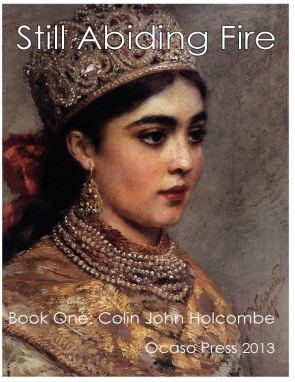That Still Abiding Fire is modeled on Dante's Divine Comedy, and also uses the terza rima form that generates terse expressiveness if handled correctly. But here hell is more contemporary — not some bottomless pit where sinners are treated to ever more diabolical torments, but the world around us, how we adulterate and ruin what should be beneficent and beautiful.

The first book evokes the splendors and miseries of human love. Each form is personified by famous lovers. Dante and Beatrice speak of a higher and everlasting love, that of God for fallen humanity. Romeo and Juliet's love is youthful and tragic infatuation. Scarlett O'Hara's love is selfish, calculating and shallow: no lasting good comes of it.
Love for Heloise
and Abelard was forbidden, and for them love is henceforth based on
service and renunciation. Tristan and Isolde's love is adulterous, and
shames the knightly code. Odysseus' love for Circe is a bodily passion,
but one surviving his return to Penelope and Ithaca. Laila and Manjun's
love is unfulfilled but transported to a higher, mystical plane, and
the lovers are only united after death. Marylyn Monroe's love is the
carnal expression of American consumerism. Finally, Radha and Krishna's
love is a physical passion that unlocks the senses to further worlds of
devotion.
Truth and fiction, the
present and the past, literary depiction, fairy tales and brute reality
— all are juxtaposed in figures that cast their shadows into a more
primaeval world, and so stand for the fallen innocence (but not
redemption) that Dante also depicted.
A free ebook in pdf format.
We buckle up and watch the needle spin
as, prospects narrowing to straight ahead,
the coloured cavalcade of days begin
to take us through that shadow-world the dead
will dandle out before us, constantly
beguiled and shifting in each wind-tossed head.
And then it's light again, and we will see
some diner, garage or communal shop
tear up and blaze on past. A fence or tree
trails off companionably until we stop,
when clouds go on before us and the blue
of far horizons settles on some mountain top
whose climb is part of us, as though it too
rose out of adolescent lands, that space
we bear reluctantly in all we do.
It's then we think of young Battuta, trace
the Qarakhanids or the Golden Horde,
the whirl of dervishes to resting-place.
And think how Huanzang's journeyings accord
with wisdoms winnowed out of days' deceits
in scriptures recollected, versed and stored.
Or merchant totting up the day's receipts,
Pizarro marking out the lands he'd rule,
the Arab voyager in tropic heats.
Of how the caliphs fought with jinn and ghoul,
for faiths their followers would soon deform,
as barefoot villager returned from school.
Odysseus the most of all, that storm
—
and-shipwrecked voyager, who knew
how Circe conjures up in human form
our desperate longings, always will. The few
who pass unscathed have learned the jeweller's art
to carve the cameo from that quiet hue
of textured honesty, which does not start
with promises beneath the counterpane
but larger purposes that serve the heart.
Within this wilderness of love and pain,
and deep immured in it, with no way out,
we fare as travellers who'd still retain
the sense of others slept with, and no doubt
a pride and tenderness, if mixed with shame
that no one's memory is long without.
Innumerable are those we cannot name
that come about us as some bar or room
is cleaned and emptied of us all the same.
And more so even when about us bloom
those longed-for miracles of limbs and eyes
which we too carelessly ignore, assume
are false remittances of breathy sighs,
repentances from dew-pressed sleep,
and not the soul alert to its disguise.